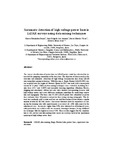Mostrar el registro sencillo del ítem
Automatic detection of high-voltage power lines in LiDAR surveys using data mining techniques
| dc.creator | Chasco Hernández, Daniel | es_ES |
| dc.creator | Sanz Delgado, José Antonio | es_ES |
| dc.creator | García Morales, Víctor | es_ES |
| dc.creator | Álvarez-Mozos, Jesús | es_ES |
| dc.date.accessioned | 2020-07-09T09:51:35Z | |
| dc.date.available | 2021-03-10T00:00:17Z | |
| dc.date.issued | 2020 | |
| dc.identifier.isbn | 978-3-030-41199-2 | |
| dc.identifier.issn | 2195-4356 | |
| dc.identifier.uri | https://hdl.handle.net/2454/37313 | |
| dc.description.abstract | The correct classification of power lines in LiDAR point clouds has attracted the interest of the mapping community in the last years. The objective of this research is the detection and automatic extraction of high-voltage transmission lines from LiDAR data using data mining techniques. With this aim, a Single Photon LiDAR (SPL) survey acquired over the region of Navarre (Spain) in 2017 was used, with a mean point density of 14 pt/m2. Different data mining techniques were evaluated, including decision trees (C4.5 and CART) and ensemble learning algorithms (Random Forests, Bagging and AdaBoost). Fifteen test sites were studied corresponding to areas with high-voltage power lines over different conditions regarding the underlying vegetation and topography. For these sites 92,104 LiDAR points were identified as power lines and more than 4M points as not power lines using existing cartography. This dataset was randomly split in train and test sets and then balanced two obtain a similar amount of data for the two classes. The results obtained show the importance of balancing the training data with improvements in accuracy of ~10% with respect to the imbalanced case. Accuracies higher than 87% were obtained in all balanced cases, with particularly successful results for ensemble learning techniques, being AdaBoost the technique with the highest accuracy 91%. These results suggest that the combination of SPL surveys and data mining tools can be successfully used for the operational mapping of high voltage power lines. | en |
| dc.description.sponsorship | The Government of Navarre and Tracasa are acknowledged for the provision of the SPL LiDAR data, the TerraScan software license and their expertise. | en |
| dc.format.extent | 9 p. | |
| dc.format.mimetype | application/pdf | en |
| dc.language.iso | eng | en |
| dc.publisher | Springer | en |
| dc.relation.ispartof | Cavas-Martínez, F., Sanz-Adan, F., Morer Camo, P., Lostado Lorza, R., Santamaría Peña, J. (Eds.) Advances in Design Engineering: Proceedings of the XXIX International Congress INGEGRAF, 20-21 June 2019, Logroño, Spain. Cham: Springer, 2020, pp. 568-575. ISBN 978-3-030-41199-2 | en |
| dc.rights | © Springer Nature Switzerland AG 2020 | en |
| dc.subject | LiDAR Data mining | en |
| dc.subject | Single Photon LiDAR | en |
| dc.subject | Power lines | en |
| dc.subject | Supervised classification | en |
| dc.title | Automatic detection of high-voltage power lines in LiDAR surveys using data mining techniques | en |
| dc.type | info:eu-repo/semantics/conferenceObject | en |
| dc.type | Contribución a congreso / Biltzarrerako ekarpena | es |
| dc.contributor.department | Ingeniería | es_ES |
| dc.contributor.department | Estadística, Informática y Matemáticas | es_ES |
| dc.contributor.department | Ingeniaritza | eu |
| dc.contributor.department | Estatistika, Informatika eta Matematika | eu |
| dc.rights.accessRights | info:eu-repo/semantics/openAccess | en |
| dc.rights.accessRights | Acceso abierto / Sarbide irekia | es |
| dc.embargo.terms | 2021-03-10 | |
| dc.identifier.doi | 10.1007/978-3-030-41200-5_62 | |
| dc.relation.projectID | info:eu-repo/grantAgreement/MINECO//MTM2015-63608-P/ES/ | en |
| dc.relation.projectID | info:eu-repo/grantAgreement/MINECO//ECO2015-65031-R/ES/ | en |
| dc.relation.publisherversion | https://doi.org/10.1007/978-3-030-41200-5_62 | |
| dc.type.version | info:eu-repo/semantics/acceptedVersion | en |
| dc.type.version | Versión aceptada / Onetsi den bertsioa | es |


